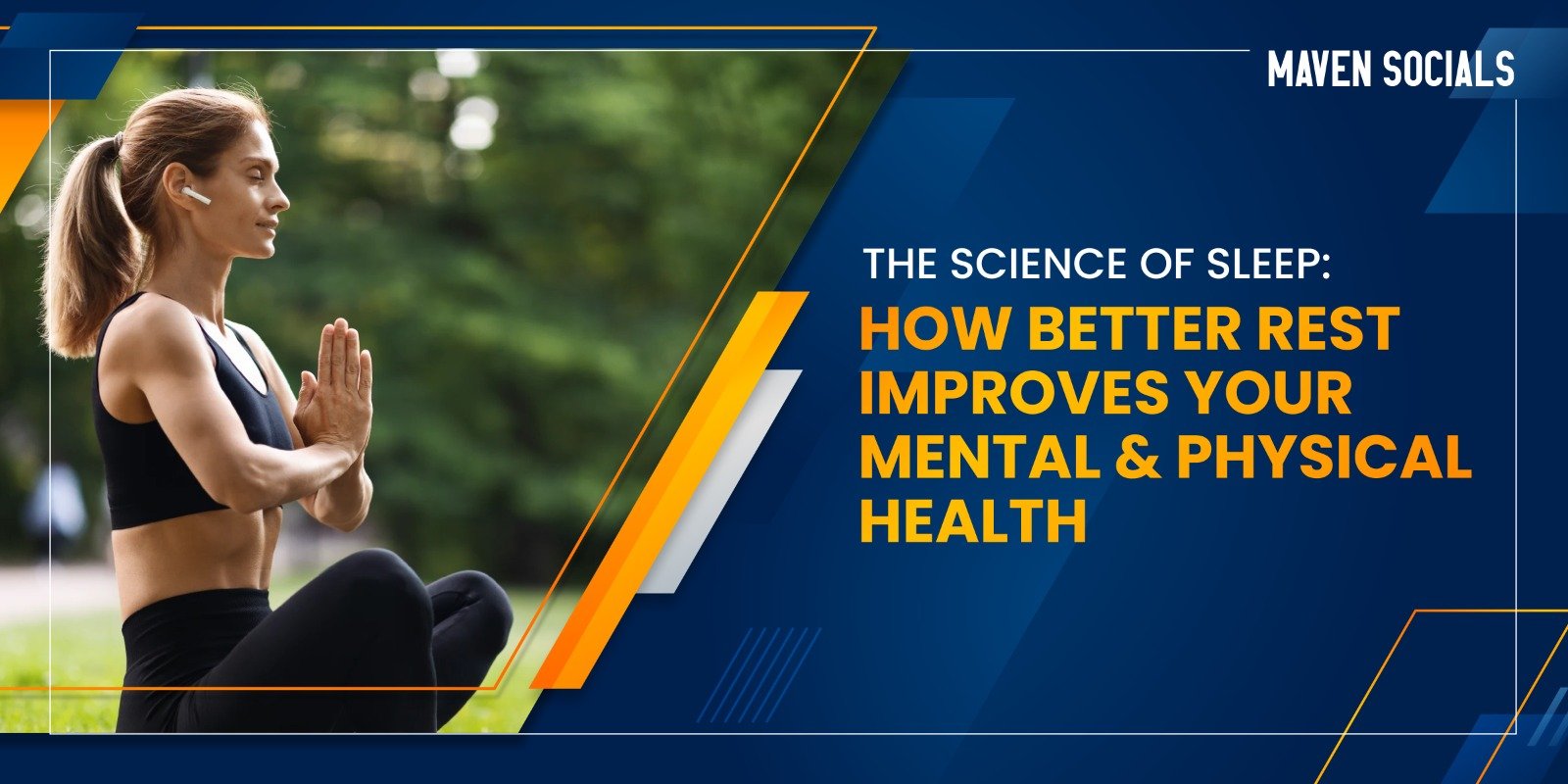Understanding the Science of Sleep
Sleep is not simply about closing your eyes and drifting off—it’s a highly structured biological process that happens in cycles. On average, one sleep cycle lasts about 90 minutes, and we go through several of these cycles each night.The four stages of sleep include:
Stage 1 (Light Sleep): A short transitional phase where your body begins to relax, and brain waves slow down.
Stage 2 (Light Sleep):Your body temperature drops, heart rate slows, and brain activity decreases further.
Stage 3 (Deep Sleep): Also called slow-wave sleep, this is when tissue repair, cell regeneration, and immune strengthening occur.
Stage 4 (REM Sleep): The dream stage, essential for memory consolidation, emotional processing, and learning.
Each stage plays a crucial role in ensuring physical recovery and mental clarity. Missing out on deep or REM sleep can leave you feeling groggy, unfocused, and more prone to illness.
Why Sleep Matters for Physical Health
1. Boosts Immune Function
During sleep, your immune system releases cytokines—proteins that help fight infections and inflammation. Without enough rest, your body becomes more vulnerable to colds, flu, and other diseases.2. Supports Heart Health
Poor sleep has been linked to high blood pressure, irregular heartbeat, and increased risk of cardiovascular diseases. Quality rest allows your blood pressure to drop at night, giving your heart and blood vessels a much-needed break.
3. Improves Weight ManagementLack of sleep disrupts hormones like leptin and ghrelin, which regulate hunger. This imbalance increases cravings for sugary and high-fat foods, leading to weight gain. Studies show that people who sleep less than 6 hours a night are more likely to become overweight or obese.
4. Enhances Physical Performance
Athletes who prioritize sleep experience better reaction times, improved accuracy, and faster recovery from training. Even for non-athletes, good sleep improves balance, coordination, and endurance.
The Link Between Sleep and Mental Health
1. Improves Memory and LearningREM sleep helps consolidate information you’ve learned during the day. This is why pulling all-nighters before an exam often backfires—you’re less likely to remember what you studied.
2. Reduces Stress and Anxiety
Sleep lowers cortisol (the stress hormone) levels. Chronic sleep deprivation, on the other hand, increases stress reactivity, making small problems feel overwhelming.
3. Stabilizes Mood
A lack of sleep is directly linked to irritability, mood swings, and emotional instability. In the long run, sleep deprivation increases the risk of depression and anxiety disorders.
4. Supports Brain Detoxification
During sleep, the brain’s glymphatic system clears out waste products like beta-amyloid, which are linked to Alzheimer’s disease. This nightly “clean-up” keeps your brain functioning optimally.
Common Sleep Disorders That Affect Health
Even if you try to sleep for 7–9 hours, certain conditions can interfere with quality rest:- Insomnia: Difficulty falling or staying asleep.
- Sleep Apnea: Interrupted breathing during sleep, leading to poor oxygen supply.
- Restless Legs Syndrome: Uncontrollable urge to move your legs at night.
- Narcolepsy: Excessive daytime sleepiness and sudden sleep attacks.
Practical Tips to Improve Your Sleep
Improving your sleep doesn’t require drastic changes. Consistency and small lifestyle adjustments can make a huge difference.
1. Maintain a Sleep Schedule
Go to bed and wake up at the same time every day—even on weekends. This trains your body’s internal clock (circadian rhythm).
2. Create a Relaxing Bedtime Routine
Activities like reading, meditation, or light stretching signal to your body that it’s time to wind down.
3. Limit Screen Time Before Bed
The blue light from phones, tablets, and computers suppresses melatonin production, making it harder to fall asleep. Aim to disconnect at least 1 hour before bedtime.
4. Optimize Your Sleep Environment
Keep your bedroom cool, dark, and quiet. Invest in a good mattress and blackout curtains if necessary.
5. Watch What You Eat and Drink
Avoid heavy meals, caffeine, and alcohol close to bedtime. While alcohol may make you sleepy initially, it disrupts REM sleep later in the night.
6. Exercise Regularly
Moderate physical activity during the day improves sleep quality. However, avoid intense workouts right before bed, as they may be too stimulating.
Long-Term Benefits of Better Sleep
When you consistently prioritize rest, the benefits accumulate:
- Sharper focus and productivity at work or school.
- Stronger immune system and reduced risk of chronic illnesses.
- Balanced mood and emotional resilience.
- Healthier weight and metabolism.
- Slower aging process, as sleep promotes cell repair and hormone balance.
In other words, sleep is not just a nightly ritual—it’s an investment in your future health.
FAQs About Sleep and Health
1. How many hours of sleep do adults really need?
Most adults need between 7–9 hours of quality sleep each night. Individual needs vary, but consistently getting less than 6 hours is linked to long-term health risks.
2. Can I “catch up” on sleep during weekends?
While sleeping in may help reduce short-term fatigue, it doesn’t fully make up for chronic sleep deprivation. A consistent schedule is healthier.
3. Is napping good or bad for health?
Short naps (20–30 minutes) can improve alertness and mood. However, long or late-afternoon naps may interfere with nighttime sleep.
4. Why do I wake up feeling tired even after 8 hours?
Poor sleep quality, underlying sleep disorders (like apnea), stress, or an inconsistent sleep cycle could be the reason. It’s worth consulting a doctor if it persists.
5. Does sleep affect skin health?
Yes. Sleep triggers collagen production and tissue repair. Lack of rest can cause dull skin, dark circles, and premature aging—hence the term “beauty sleep.”
6. How does sleep affect weight loss?
Good sleep regulates hunger hormones, reduces late-night cravings, and supports metabolism, making weight management easier.
Final Thoughts
Sleep is more than just a time to rest—it’s a biological necessity that shapes our mental sharpness, emotional stability, and physical vitality. By understanding the science of sleep and making small adjustments to your routine, you can unlock better health, improved focus, and a higher quality of life.
So tonight, instead of staying up late, consider giving your body and mind the gift of restful sleep—it’s one of the most powerful medicines available, and it’s completely free.













